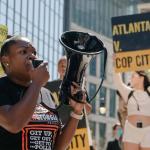Atlanta’s Cop City Is Fundamentally Undemocratic

After working to avoid a referendum on a controversial proposed police training site known as “Cop City,” Atlanta city officials have finally given up on trying to deny voters a say. But the ongoing clash illustrates how the United States is alternately stumbling and careening away from democracy. Escalating police violence and ill-advised prosecutions against protesters in Atlanta, as well as repeated delays on the ballot measure, mirror increasingly authoritarian practices being deployed across the country.
Cop City is a $90 million facility proposed to be built south of Atlanta. Community members and activists from all over the world object to Cop City, raising concerns about racial justice, police practices, public funding decision-making, environmental justice and basic democratic ideals.
Despite fierce and vocal opposition, in June, the Atlanta City Council approved moving the project forward. This type of police and government response, especially after the murder of George Floyd in 2020, however, raises questions about how the police envision actually “serving and protecting” our communities.
Public funds should be used to invest in education, jobs with justice and non-carceral responses to achieve community safety rather than expensive and unnecessary law enforcement programs. Atlanta has a poverty rate of 17.9 percent and the highest income inequality rate in the country. The choice to spend $90 million on Cop City rather than on proven remedies for societal challenges is a troubling indication that policymakers in Atlanta are improperly focused on addressing symptoms rather than root causes.
Cop City, beyond contributing to over-policing, will require clear-cutting 381 acres of forest land—one of Atlanta’s lungs —that was initially stolen from Muscogee people. This dangerously ignores long-standing local environmental injustices and the worsening climate crisis. Moreover, the land is in unincorporated Dekalb County, where residents have no representation on the Atlanta City Council, which made the decision. It is no accident that the surrounding community that faces further loss of limited green space and clean air is also primarily Black.
The police have responded to the Cop City protests with mounting violence. The police killing of a queer Indigenous forest defender, Tortuguita, in January, is alarming. Dozens of people arrested during the protests for what, at most, would be considered disorderly conduct elsewhere are potentially facing decades in prison. Prosecutors have charged them with domestic terrorism under a new Georgia law, a warning and a deliberate attempt to deter protests of any kind.
The subsequent and unprecedented government raid of a bail and legal defense fund violates protections by the U.S. Constitution and international human rights law.
Stop Cop City organizers are gathering signatures to place a referendum on the November ballot to repeal the ordinance authorizing the land lease, so this struggle is not over. Although Cop City may feel far away for many, the issues it raises stand as a cautionary tale about the direction of the country that we all need to heed.
This column was produced for Progressive Perspectives, a project of The Progressive magazine, and distributed by Tribune News Service.
